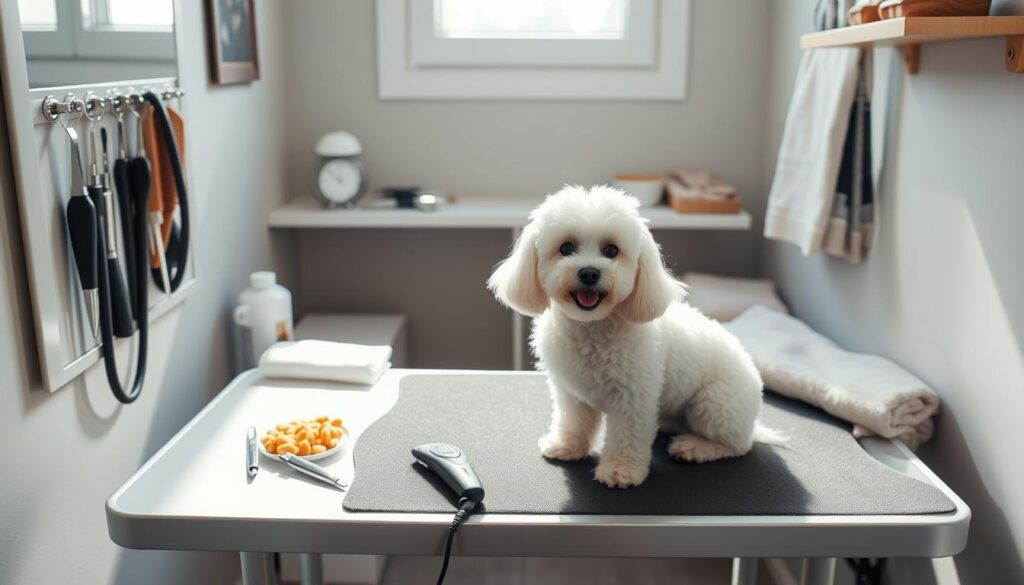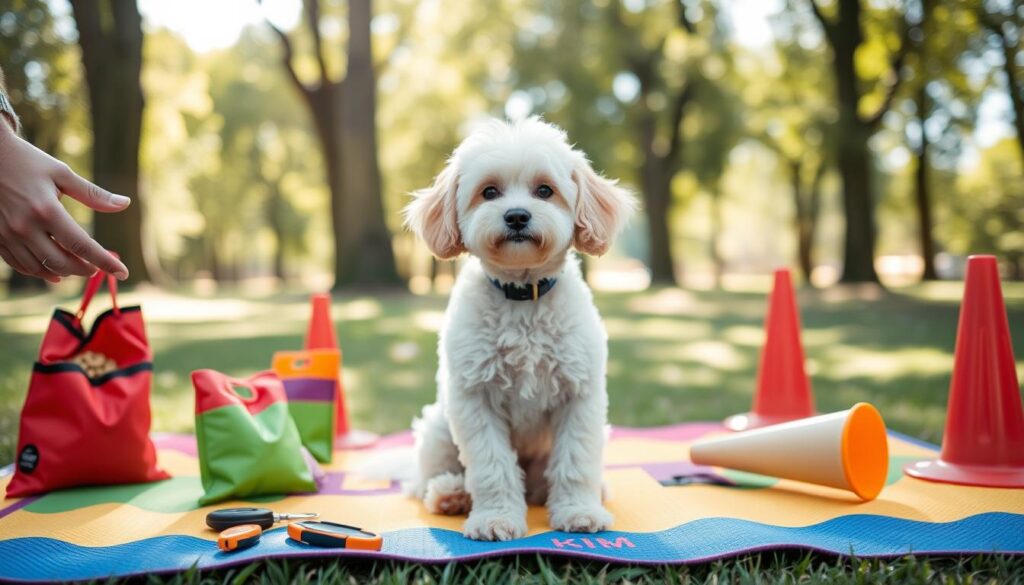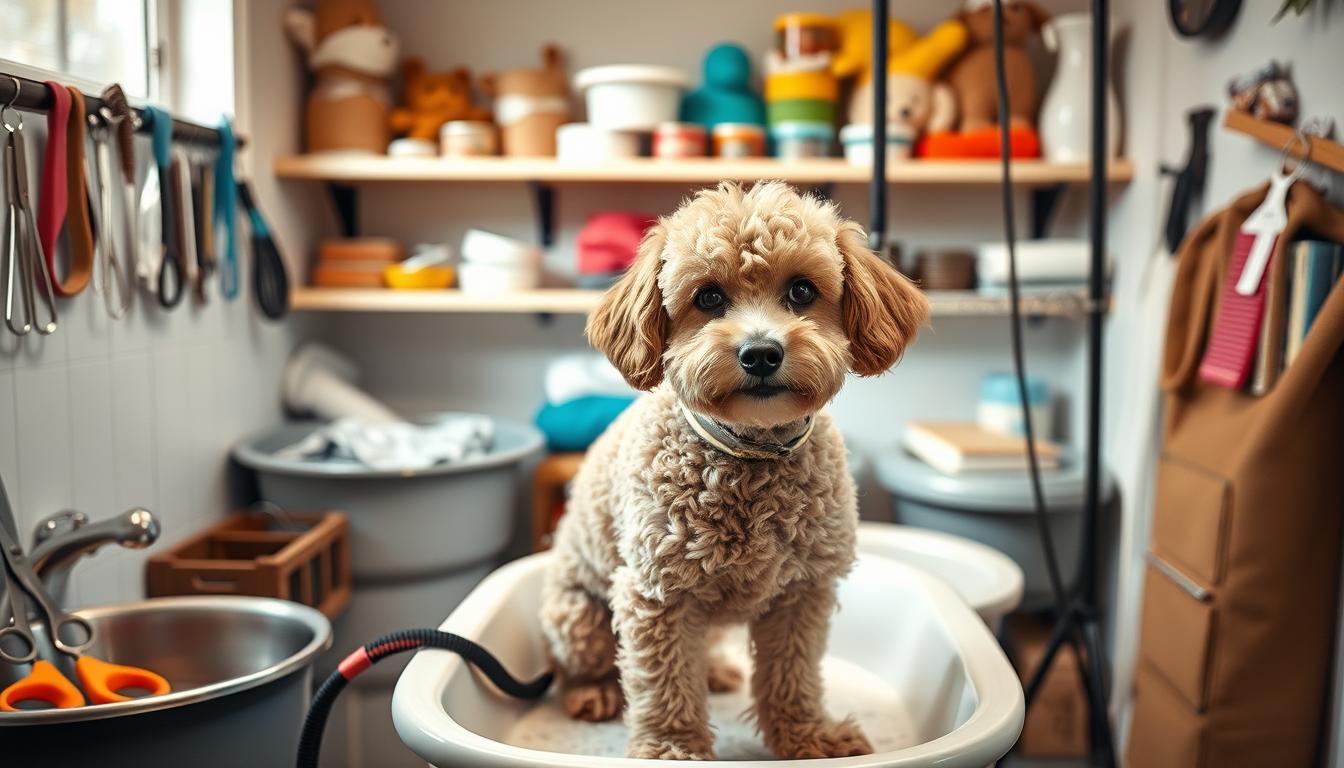Welcome to our comprehensive Miniature Poodle care guide, designed to provide new owners with essential information on caring for their furry companion. Our goal is to cover various aspects of Miniature Poodle care, including breed characteristics, health considerations, grooming needs, and training techniques, to ensure you can provide the best Mini Poodle health care possible.
As a responsible owner, it’s crucial to understand the needs of your Miniature Poodle, from their physical characteristics to their temperament and personality traits. By following this Miniature Poodle care guide, you’ll be well-equipped to provide a happy, healthy life for your pet. Our guide will walk you through every step, from creating a comfortable living space to establishing a nutritious diet and exercise routine, all part of a well-rounded Mini Poodle health care plan.
Our aim is to empower you with the knowledge and skills necessary to provide exceptional care for your Miniature Poodle, ensuring a strong bond and a lifelong friendship. Whether you’re a first-time owner or an experienced pet parent, our guide will serve as a valuable resource, covering everything from basic needs to advanced training techniques, all part of a comprehensive Miniature Poodle care guide.
Key Takeaways
- Understand the breed characteristics and needs of your Miniature Poodle
- Provide a comfortable and safe living space for your pet
- Establish a nutritious diet and exercise routine as part of a Mini Poodle health care plan
- Invest time in training and socialization for a well-behaved pet
- Stay informed about common health issues and preventive care measures for your Miniature Poodle
- Follow a comprehensive Miniature Poodle care guide for a happy and healthy pet
Understanding the Miniature Poodle Breed
The Miniature Poodle is a charming and intelligent breed, making it a popular choice for many dog lovers. As part of your Miniature Poodle care guide, it’s essential to recognize the unique qualities that set this breed apart.
Physical Characteristics and Size
Miniature Poodles typically weigh between 12 to 15 pounds and stand about 11 to 15 inches tall. Their curly, dense coat comes in various colors, including black, white, apricot, and more. Regular grooming is necessary to maintain their signature look and prevent matting.
Temperament and Personality Traits
Known for their high intelligence, Miniature Poodles are quick learners and eager to please. They are affectionate, making strong bonds with their families, and adapt well to different living environments. Their lively and playful nature makes them excellent companions.
Life Expectancy and Development Stages
Miniature Poodles have a life expectancy of 12 to 15 years. Their development stages include puppyhood, adolescence, and adulthood, each requiring specific care and training as part of your Miniature Poodle care guide. Proper attention during these stages ensures a healthy and well-adjusted dog.
| Development Stage | Age Range | Key Characteristics |
|---|---|---|
| Puppy | 0-6 Months | Rapid growth, training, socialization |
| Adolescence | 6-18 Months | Behavioral training, increased energy |
| Adulthood | 18 Months – 12 Years | Stable behavior, ongoing mental stimulation |
Essential Supplies for Your Mini Poodle
As a Miniature Poodle owner, it’s crucial to have the right supplies to ensure your pet’s comfort, health, and happiness. When it comes to best food for Miniature Poodles, you’ll want to choose a high-quality option that meets their nutritional needs. Some excellent choices include Royal Canin, Hill’s Science Diet, and Blue Buffalo.
In addition to a well-balanced diet, your Mini Poodle will need a few essential items, including:
- Comfortable bedding, such as a plush dog bed or mattress
- Durable toys, like rubber balls or plush squeaky toys
- Grooming tools, including a brush, nail clippers, and shampoo
- Basic training equipment, like a collar, leash, and training pads
Feeding your Mini Poodle the best food for Miniature Poodles is vital for their overall health and well-being. A good quality food will provide the necessary nutrients for optimal growth, energy, and coat condition. Be sure to consult with your veterinarian to determine the best diet for your Mini Poodle based on their age, size, and health status.
Here is a summary of the essential supplies you’ll need for your Mini Poodle:
| Supply | Description |
|---|---|
| Food | High-quality dog food, such as Royal Canin or Hill’s Science Diet |
| Bedding | Comfortable dog bed or mattress |
| Toys | Durable toys, like rubber balls or plush squeaky toys |
| Grooming tools | Brush, nail clippers, shampoo, and conditioner |
| Training equipment | Collar, leash, and training pads |
Creating the Perfect Living Space
A well-designed environment is crucial in your Miniature Poodle care guide. It promotes safety, comfort, and happiness for your furry friend.
Indoor Setup Requirements
Establish a cozy sleeping area with a high-quality dog bed. Puppy-proof your home by securing loose wires and removing harmful substances. Provide designated potty training spots to maintain a clean living space.
Outdoor Safety Considerations
Ensure your backyard has secure fencing to prevent escapes. Always supervise outdoor activities to protect your Miniature Poodle from potential hazards like traffic or wild animals.
Temperature Control and Comfort
Maintain a stable indoor temperature with proper heating or cooling systems. When outdoors, offer shade during hot weather and shelter during cold conditions to keep your Miniature Poodle comfortable year-round.
Comprehensive Miniature Poodle Care Guide
Maintaining Mini Poodle health care involves a balanced daily routine. Start with a nutritious diet tailored to your dog’s needs. Regular feeding times help establish consistency and support their overall health.
Exercise is crucial for keeping your Miniature Poodle active and happy. Daily walks and playtime not only burn energy but also promote cardiovascular health. Incorporate fun activities like fetch or agility training to keep them engaged.
Grooming is another essential aspect of Mini Poodle health care. Regular brushing prevents matting and keeps their coat shiny. Scheduled grooming sessions also provide an opportunity to check for any skin issues or parasites.
Mental stimulation is vital for your dog’s well-being. Provide puzzle toys, training exercises, and interactive games to keep their minds sharp. Engaging activities reduce boredom and prevent behavioral problems.
Regular health check-ups are a cornerstone of Mini Poodle health care. Partner with a trusted veterinarian to schedule routine exams and vaccinations. Preventive care helps catch potential health issues early, ensuring a longer, healthier life for your pet.
For more insights on dog breeds and their care, visit our comprehensive guide.
- Balanced Diet
- Daily Exercise
- Regular Grooming
- Mental Stimulation
- Routine Health Check-ups
By following these guidelines, you can ensure excellent Mini Poodle health care and enjoy a happy, healthy life with your furry friend.
Nutrition and Feeding Guidelines
Providing the best food for Miniature Poodles is essential for their health and vitality. A balanced diet ensures they receive the necessary nutrients to thrive.
Recommended Food Types
Selecting high-quality commercial dog foods is a great option for Miniature Poodles. Brands like Royal Canin and Blue Buffalo offer formulas tailored to their size and energy needs. Alternatively, a homemade diet can be prepared with guidance from a veterinarian to ensure all nutritional requirements are met.
Feeding Schedule and Portions
Establishing a consistent feeding schedule helps maintain your Miniature Poodle’s weight and energy levels. Follow these guidelines:
- Puppies (up to 6 months): 3-4 meals daily.
- Adults: 2 meals daily.
- Portion Sizes: Vary based on age, weight, and activity level. Refer to the dog food packaging or consult your vet for precise measurements.
Special Dietary Considerations
Some Miniature Poodles may have food allergies or sensitivities. Common allergens include beef, dairy, and wheat. If your dog exhibits symptoms like itching or digestive issues, consider hypoallergenic diets or limited ingredient foods to identify and eliminate problematic ingredients.
| Food Type | Benefits | Recommended Brands |
|---|---|---|
| Commercial Kibble | Convenient, balanced nutrition | Royal Canin, Blue Buffalo |
| Homemade Diet | Control over ingredients, tailored nutrition | Consultation with a vet required |
| Raw Diet | High protein, natural feeding | Stella & Chewy’s, Primal |
| Wet Food | Higher moisture content, tasty | Wellness, Hill’s Science Diet |
Grooming Your Miniature Poodle
Regular grooming is essential to keep your Miniature Poodle healthy and happy. Implementing effective Poodle grooming tips will ensure your pet’s coat remains beautiful and free from tangles.

- Brushing: Brush your poodle’s coat daily to prevent matting and remove loose hairs.
- Bathing: Bathe your dog once a month using a gentle, dog-specific shampoo.
- Nail Trimming: Trim nails every few weeks to avoid overgrowth and discomfort.
- Ear Cleaning: Clean ears weekly to prevent infections.
- Teeth Brushing: Brush teeth several times a week to maintain oral health.
Choosing the right haircut can enhance your Miniature Poodle’s appearance. Below is a table of popular styles:
| Haircut | Description |
|---|---|
| Puppy Cut | A simple, short trim that keeps the coat manageable. |
| Continental Clip | A traditional style with shaved areas and longer hair on the body. |
| Sport Clip | Practical for active dogs, with shorter hair for ease of movement. |
Decide whether to groom at home or seek professional services based on your comfort level and your poodle’s needs. Regular grooming not only maintains your dog’s appearance but also promotes overall well-being.
Exercise and Physical Activity Needs
Keeping a Miniature Poodle active is essential for their overall well-being. A well-planned Miniature Poodle exercise routine helps maintain a healthy weight and promotes mental stimulation.
Daily Exercise Requirements
Miniature Poodles thrive on regular activity. Aim for at least 30 minutes of exercise each day. Adjust the duration based on your dog’s age and energy levels to keep them happy and healthy.
Suitable Activities and Games
Engaging your Miniature Poodle in various activities ensures they stay physically and mentally fit. Consider the following:
- Walks: Daily walks provide essential physical exercise and mental stimulation.
- Fetch: A fun game that encourages running and chasing.
- Agility Training: Enhances coordination and obedience.
- Interactive Toys: Keeps their minds sharp and entertained.
Exercise Safety Tips
Ensure your Miniature Poodle exercises safely by following these tips:
- Warm-Up and Cool-Down: Prevent injuries by gradually increasing and decreasing activity levels.
- Hydration: Always provide fresh water before and after exercise.
- Monitor Intensity: Watch for signs of fatigue or overheating, especially in warmer weather.
- Use Proper Equipment: Ensure collars and leashes fit correctly to avoid discomfort or accidents.
| Age | Exercise Duration | Recommended Activities |
|---|---|---|
| Puppies (up to 1 year) | 20-30 minutes daily | Short walks, gentle play, basic training |
| Adults (1-7 years) | 30-60 minutes daily | Walks, fetch, agility, interactive toys |
| Seniors (7+ years) | 20-30 minutes daily | Leisurely walks, light play, mental puzzles |
Health Maintenance and Veterinary Care
Maintaining optimal Mini Poodle health care is essential for a happy and long life. Regular veterinary visits help identify and address potential issues early.
Common Health Issues
Miniature Poodles are generally healthy but can be prone to certain conditions:
- Hip dysplasia
- Progressive retinal atrophy
- Patellar luxation
Early detection through routine check-ups is vital to manage these health concerns effectively.
Vaccination Schedule
Following a recommended vaccination schedule ensures your Mini Poodle is protected against various diseases:
- Distemper
- Parvovirus
- Rabies
Consult your veterinarian to establish a vaccination plan tailored to your dog’s needs.
Preventive Care Measures
Implementing preventive care measures contributes significantly to Mini Poodle health care:
- Regular veterinary check-ups
- Dental care to prevent gum disease
- Parasite prevention to avoid infestations
Consistent preventive care helps maintain your Miniature Poodle’s overall well-being.
Training Your Mini Poodle
Miniature Poodles are known for their intelligence and eagerness to please, making them excellent candidates for effective training. Utilizing proven Miniature Poodle training techniques can help you build a strong bond with your furry friend while ensuring they grow into well-behaved companions.
Begin with basic obedience training by teaching essential commands such as:
- Sit
- Stay
- Come
- Heel
Implement positive reinforcement methods, including treats and praise, which are particularly effective with this breed. Consistent house training and addressing common behavioral issues early on can prevent future challenges.
For those interested in further enhancing your Miniature Poodle’s skills, advanced training opportunities like agility courses or therapy dog programs offer mental stimulation and strengthen your connection. Explore comprehensive training resources to tailor your approach to your pup’s unique needs.

| Training Stage | Techniques | Purpose |
|---|---|---|
| Basic Obedience | Sit, Stay, Come, Heel | Establish foundational commands |
| House Training | Crate Training, Scheduled Breaks | Maintain a clean home environment |
| Behavioral Training | Positive Reinforcement, Clicker Training | Address and prevent unwanted behaviors |
| Advanced Training | Agility, Therapy Dog Training | Mental stimulation and bonding |
Socialization Strategies and Tips
Proper socialization is essential for Miniature Poodles to develop into well-adjusted and friendly companions. Implementing effective socialization strategies from an early age can prevent behavioral issues and enhance your dog’s confidence.
Early Socialization Methods
Begin socializing your Miniature Poodle puppy as soon as possible. Start with gentle introductions to different people, sounds, and environments. Enroll in puppy classes to provide structured interactions and use positive reinforcement to reward good behavior.
Interaction with Other Pets
Introducing your Miniature Poodle to other pets should be done gradually. Supervise initial meetings and use treats to create positive associations. Ensure all animals have their own space to prevent conflicts and encourage harmonious relationships within the household.
Public Setting Behavior
Training your Miniature Poodle to behave well in public settings is crucial. Practice commands like “sit” and “stay” in parks and pet-friendly areas. Use a harness and leash to maintain control and reinforce calm behavior with praise and rewards during outings.
Mental Stimulation and Enrichment
Engaging your Miniature Poodle’s mind is a crucial aspect of the Miniature Poodle care guide. These intelligent dogs thrive when given regular mental challenges, which help prevent boredom and unwanted behaviors.
Incorporate puzzle toys and interactive games into your dog’s daily routine. These tools encourage problem-solving and keep your poodle entertained. Training exercises, such as obedience drills and trick learning, not only build a stronger bond but also provide necessary mental workouts.
Scent work is another excellent way to stimulate your Miniature Poodle’s senses. Activities like hide and seek with treats or toys tap into their natural hunting instincts, offering both fun and mental exercise.
Integrating mental enrichment into everyday activities ensures your poodle remains happy and well-adjusted. Simple actions, like changing walking routes or introducing new commands, can make a significant difference in their mental well-being.
| Activity | Benefits |
|---|---|
| Puzzle Toys | Enhances problem-solving skills and keeps poodles occupied. |
| Interactive Games | Promotes physical and mental engagement. |
| Obedience Training | Strengthens command understanding and improves behavior. |
| Scent Work | Stimulates natural instincts and provides sensory enrichment. |
Traveling with Your Miniature Poodle
Taking your Miniature Poodle on trips can be a rewarding experience with the right preparation. Ensuring your pet’s safety and comfort is paramount.
Car Travel Safety
Secure your Miniature Poodle using a sturdy carrier or a pet seatbelt. This prevents distractions while driving and keeps your poodle safe in case of sudden stops.
Accommodation Planning
Choose pet-friendly accommodations that welcome Miniature Poodles. Check for amenities like secure fencing and nearby parks to help your dog feel at home.
Travel Essentials Checklist
- Portable water bowl
- Familiar toys
- Necessary medications
- Grooming supplies
- Leash and collar

Additionally, consider your Miniature Poodle’s adjustment to new environments by gradually introducing them to travel routines. For longer trips, plan regular breaks to allow your dog to relieve itself and stretch.
| Travel Tip | Details |
|---|---|
| Secure Restraints | Use carriers or seatbelts to keep your poodle safe. |
| Pet-Friendly Accommodations | Ensure the place allows pets and has necessary amenities. |
| Essentials to Pack | Water, toys, medications, grooming tools, leash. |
Common Behavioral Challenges and Solutions
Miniature Poodles are intelligent and active, but they may face behavioral issues like separation anxiety and excessive barking. Understanding these challenges is key to effective Mini Poodle behavioral training.
- Separation Anxiety: Poodles may become distressed when left alone.
- Excessive Barking: This can be a response to boredom or alerting.
- Resource Guarding: Protecting toys or food from others.
- Leash Reactivity: Reacting negatively to other dogs or distractions while on a walk.
Addressing these issues involves consistent and patient training. Here are some effective strategies:
- Positive Reinforcement: Reward good behavior to encourage repetition.
- Desensitization: Gradually get your Poodle used to being alone.
- Obedience Training: Teach commands that improve control and behavior.
- Professional Help: When challenges persist, consulting a certified dog trainer can be beneficial.
Consistency is crucial in Mini Poodle behavioral training. Regular routines and clear boundaries help your dog feel secure and reduce anxiety. Patience and understanding go a long way in fostering a well-behaved and happy pet.
| Behavioral Challenge | Solution |
|---|---|
| Separation Anxiety | Gradual alone time training and creating a safe space |
| Excessive Barking | Provide sufficient exercise and mental stimulation |
| Resource Guarding | Teach “drop it” command and manage resource availability |
| Leash Reactivity | Use positive reinforcement during walks and avoid triggers |
Embracing the Joy of Miniature Poodle Ownership
As you embark on your journey with your adorable Miniature Poodle, embrace the joys and rewards that come with this delightful breed. While the Miniature Poodle care guide has provided you with a comprehensive understanding of their needs, the true magic lies in the bond you’ll build with your furry companion.
These intelligent, affectionate, and adaptable dogs have a unique charm that will captivate your heart. Whether you’re enjoying a game of fetch, cuddling on the couch, or showcasing their skills in dog sports, your Miniature Poodle will become an inseparable part of your family. Remember, your pet’s needs may evolve over time, so remain open to continuous learning and adaptation to ensure their well-being.
Cherish the moments you share with your Miniature Poodle, and find ways to create lasting memories together. From participating in therapy work to simply relishing in the joys of everyday life, your bond will deepen, and the rewards of Miniature Poodle ownership will become increasingly evident. Embrace the journey, and let the unconditional love of your furry companion enrich your life in ways you never imagined.
FAQ
What are the physical characteristics and size of Miniature Poodles?
Miniature Poodles are a compact and well-proportioned breed, typically standing between 10-15 inches tall at the shoulder and weighing between 15-20 pounds. They have a distinctive curly, hypoallergenic coat that requires regular grooming to maintain its unique appearance.
What is the temperament and personality of Miniature Poodles?
Miniature Poodles are known for their intelligence, affectionate nature, and adaptability. They are eager to please, making them highly trainable. Mini Poodles thrive on human interaction and can be excellent companions for families, singles, or seniors.
What is the average life expectancy of Miniature Poodles?
Miniature Poodles have a relatively long lifespan, with an average life expectancy of 12-15 years. Proper care, nutrition, and preventive healthcare can help ensure your Mini Poodle enjoys a long and healthy life.
What are the essential supplies needed for a Miniature Poodle?
Essential supplies for a Miniature Poodle include high-quality dog food, feeding bowls, comfortable bedding, interactive toys, grooming tools (such as brushes, combs, and nail clippers), and basic training equipment (leashes, collars, and treats).
How should I set up the living space for a Miniature Poodle?
When setting up the living space for a Miniature Poodle, ensure there is a designated sleeping area, provide ample space for indoor exercise and playtime, and consider temperature control and comfort measures. Outdoor areas should be securely fenced, and supervision is crucial during outdoor activities.
What are the recommended types of food and feeding guidelines for Miniature Poodles?
Miniature Poodles thrive on a high-quality, balanced diet formulated for their size and activity level. Feeding schedules and portion sizes should be adjusted based on your Mini Poodle’s age, weight, and energy requirements. Special dietary considerations, such as food allergies, may also need to be addressed.
How often should I groom my Miniature Poodle?
Miniature Poodles require regular grooming, typically every 4-6 weeks, to maintain their distinctive coat and prevent matting. Grooming includes brushing, bathing, trimming, and shaping the coat, as well as nail trimming and ear cleaning.
How much daily exercise does a Miniature Poodle need?
Miniature Poodles are active dogs that require daily exercise, typically 30-60 minutes of activity. This can include walks, playtime, and interactive games that provide both physical and mental stimulation. Exercise should be tailored to your Mini Poodle’s age and energy level.
What are some common health issues in Miniature Poodles?
Miniature Poodles may be prone to certain health issues, such as hip dysplasia, progressive retinal atrophy, and patellar luxation. Regular veterinary check-ups, preventive care, and following a recommended vaccination schedule are essential for maintaining your Mini Poodle’s well-being.
How do I effectively train a Miniature Poodle?
Miniature Poodles respond well to positive reinforcement training methods that capitalize on their intelligence and eagerness to please. Training should focus on basic obedience commands, house-training, and addressing any behavioral challenges. Providing mental stimulation through advanced training can also be beneficial.
How do I socialize my Miniature Poodle?
Proper socialization is crucial for Miniature Poodles. Start exposing your puppy to a variety of people, animals, and environments in a positive, controlled manner. Gradually introduce your Mini Poodle to new experiences, ensuring they remain calm and comfortable. This helps develop a well-mannered, confident companion.
How can I provide mental stimulation for my Miniature Poodle?
Miniature Poodles require regular mental stimulation to prevent boredom and associated behavioral issues. Engage your Mini Poodle with interactive toys, food puzzles, scent work, and training exercises that challenge their problem-solving skills. Incorporating these activities into your daily routine can help keep your Miniature Poodle’s mind active and engaged.
What are some considerations for traveling with a Miniature Poodle?
When traveling with a Miniature Poodle, ensure their safety by using appropriate restraints or carriers in the car. Research pet-friendly accommodations and plan ahead for your Mini Poodle’s needs, such as bringing familiar toys, treats, and supplies. Consider your Poodle’s comfort and adjust your travel plans accordingly.
How can I address common behavioral challenges with my Miniature Poodle?
Miniature Poodles may occasionally exhibit behavioral issues, such as separation anxiety, excessive barking, or leash reactivity. Address these challenges through positive reinforcement training, consistency, and patience. If the behavioral problems persist or worsen, it may be beneficial to seek the guidance of a certified dog trainer or behaviorist.

